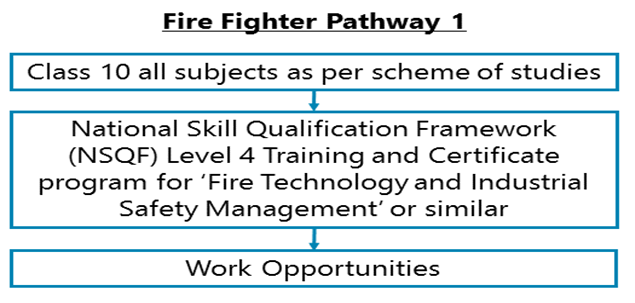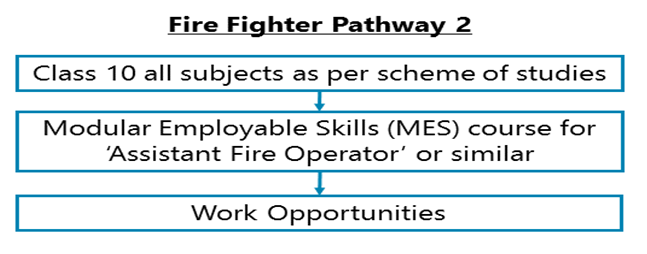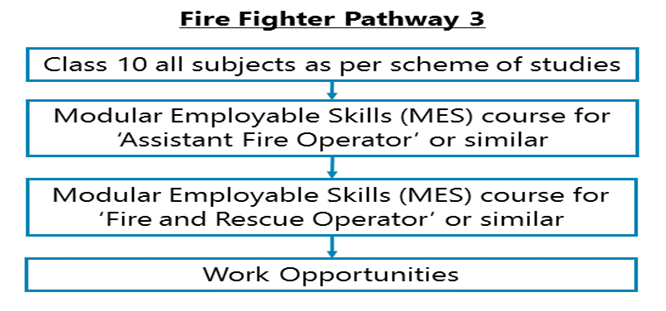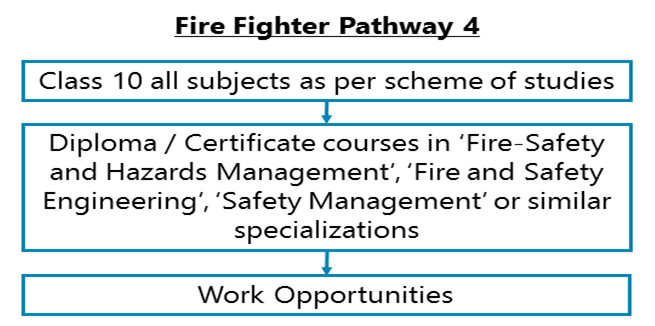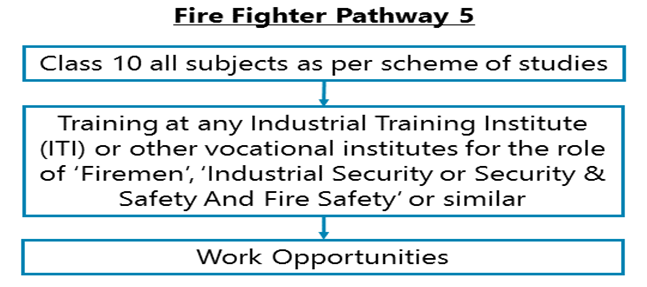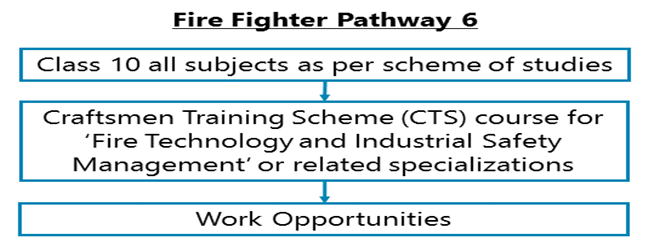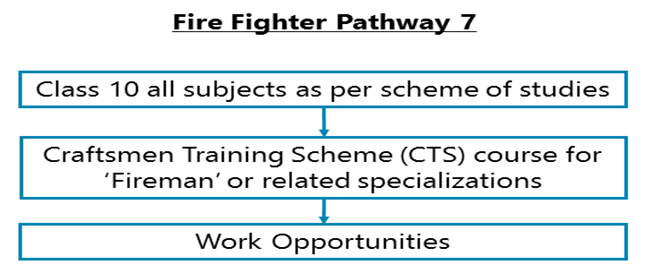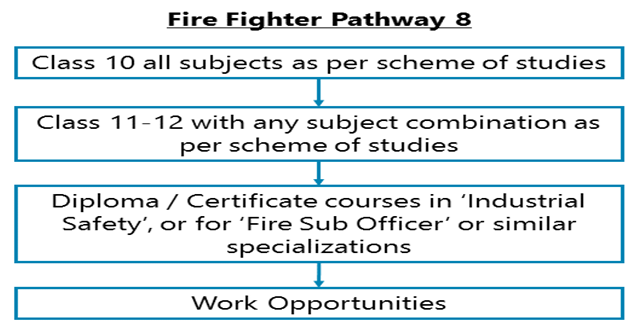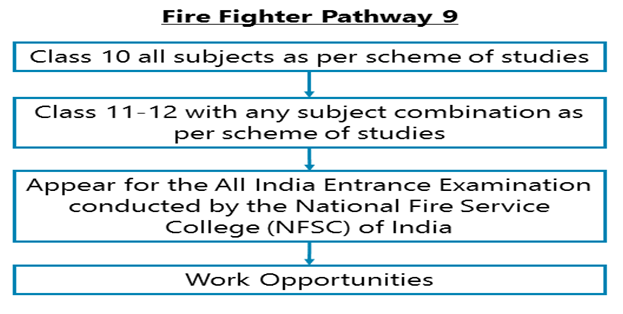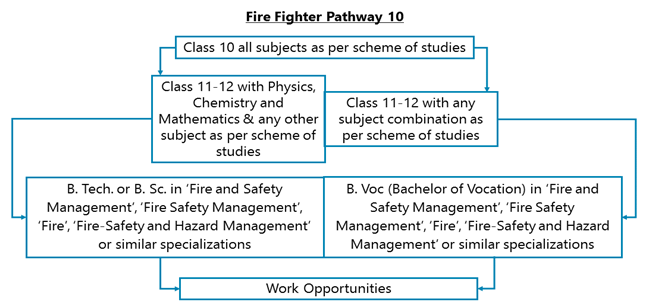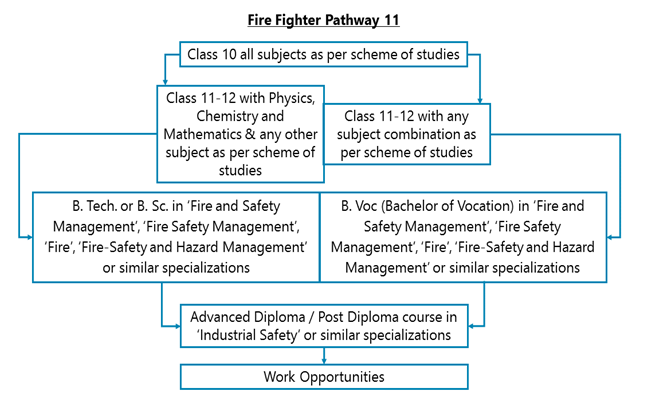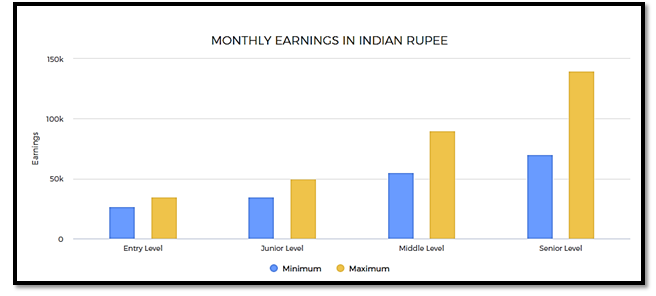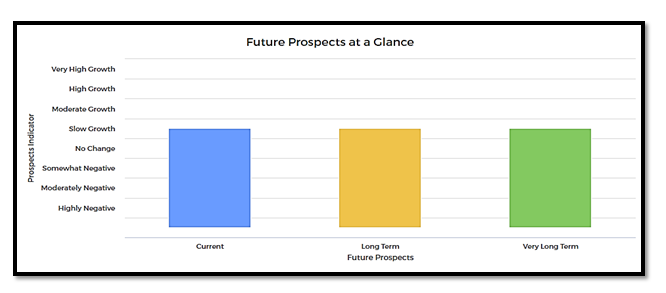Fire Fighter
Entry Level Qualification
12
Career Fields
Government & Defense Services
For Specially Abled




Career Entrance Exam
About Career
PARTICULARS | DESCRIPTION |
Name | Fire Fighter |
Purpose | Extinguishing Fames And Saving People |
Career Field | Government & Defense Services |
Required Entrance Exam | No Entrance Exam |
Average Salary | 350000 - 600000 Rs. Per Year |
Companies For You | National Fire Service, National Fire Protection Association, Bureau of Fire Protection & Many More |
Who is Eligible | Class 12th Pass |
1. As a Fire Fighter, you will be involved in protecting the public and affected civil assets (building, bridges, parks etc.) in emergency crises situations caused due to the spread of accidental fire. You will be responsible for rescue operations, providing emergency medical aid (calling ambulances or healthcare personnel) or other related emergency services.
2. You will have to respond to emergency or service calls. You may also have to drive vehicles with fire-fighting equipment to target locations in response to service calls. You will be a member of a platoon or shift or infantry unit (working groups of firefighters).
3. You will have to hold the nozzles and spray water jets or streams to extinguish the fire. You will have to participate in evacuation activities helping people to leave or come out of affected buildings. You will be operating firefighting apparatuses.
4. You will have to attend educational workshops, physical fitness training sessions and participate in scheduled practice / mock drills to enhance technical knowledge. Firefighters have to work in dangerous and hazardous working conditions. Firefighters work for long shifts that can stretch up to 24 hours too.
Key Roles and Responsibilities :
As a Fire Fighter, you will be engaged with one or more of the following roles and responsibilities: -
1. You will drive fire trucks or other equipped rescue vehicles in emergency situations.
2. You will put out fires using water hoses, fire extinguishers, and pumps.
3. You will ventilate buildings to release heat, smoke, and other toxic gases.
4. You will promptly provide assistance to affected people following standard protocol and work policies.
5. You will find and rescue victims from the scene of the incident.
6. You will offer first aid to injured people and also assist in providing immediate medical care to patients.
7. You will work with ambulance service personnel and the police.
8. You will prevent the occurrence of fires by conducting timely surveys and inspections for safety hazards.
9. You will educate people on how to prevent fire by conducting educational and training programs/workshops or demonstrating the use of firefighting equipment.
10. You will attend educational workshops, physical fitness training sessions and participate in scheduled practice / mock drills to enhance technical knowledge.
11. You will manage incoming service calls, equipment inspection/repair activities, or other operational duties.
Career Entry Pathway
Class 10 all subjects as per scheme of studies - NSQF Level 4 Training and Certificate for ‘Fire Technology and Industrial Safety Management’
After completing Class 10 all subjects as per scheme of studies, you can go for National Skill Qualification Framework (NSQF) Level 4 Training and Certificate program for ‘Fire Technology and Industrial Safety Management’ or similar courses. The total number of training hours is 2080.
Class 10 all subjects as per scheme of studies – MES course for ‘Assistant Fire Operator’ or similar courses
After completing Class 10 all subjects as per scheme of studies, you can enroll for Modular Employable Skills (MES) course for ‘Assistant Fire Operator’ or similar courses based on Skill Development Initiative Scheme (SDIS) framework under the Ministry of Labour and Employment of India.
Class 10 all subjects as per scheme of studies – MES course for ‘Assistant Fire Operator’ or similar courses - MES course for ‘Fire and Rescue Operator’ or similar courses
After completing Class 10 all subjects as per scheme of studies, you can enroll for Modular Employable Skills (MES) course for ‘Assistant Fire Operator’ or similar courses based on Skill Development Initiative Scheme (SDIS) framework under the Ministry of Labour and Employment of India. Then you can enroll for Modular Employable Skills (MES) course for ‘Fire and Rescue Operator’ or similar courses based on Skill Development Initiative Scheme (SDIS) framework under the Ministry of Labour and Employment of India. It is mandatory to finish the 1st course to do the 2nd one.
Class 10 all subjects as per scheme of studies – Diploma / Certificate courses in ‘Fire-Safety and Hazards Management’ or similar
After completing Class 10 all subjects as per scheme of studies, you can go for Diploma / Certificate courses in ‘Fire-Safety and Hazards Management’, ‘Fire and Safety Engineering’, ‘Safety Management’ or similar specializations.
Class 10 all subjects as per scheme of studies - training for ‘Firemen’ at an ITI or similar institute
After completing Class 10 all subjects as per scheme of studies, you can go for training at any Industrial Training Institute (ITI), National Skill Training Institute (NSTI), Regional Vocational Training Institute (RVTI), National Vocational Training Institute (NVTI), Industrial Training Center (ITC) or other vocational institutes for the role of ‘Firemen’, ‘Industrial Security or Security & Safety And Fire Safety’ or similar. You will sit for All India Trade Test (AITT) to get a National Trade Certificate (NTC) after this course. This exam is held twice a year in the months of February and July.
Class 10 all subjects as per scheme of studies – CTS training for ‘Fire Technology and Industrial Safety Management’
After completing Class 10 all subjects as per scheme of studies, you can go for the Craftsmen Training Scheme (CTS) course for ‘Fire Technology and Industrial Safety Management’ or related specializations compliant to National Skills Qualification Framework Level 4. This is a 1-year course with 2 semesters of 6 months each.
Class 10 all subjects as per scheme of studies – CTS training for ‘Fireman’
After completing Class 10 all subjects as per scheme of studies, you can go for the Craftsmen Training Scheme (CTS) course for ‘Fireman’ or related courses compliant to National Skills Qualification Framework Level 3. This is a 6 month course with 1 semester.
Class 10 all subjects as per scheme of studies - Class 11-12 with any subject combination as per scheme of studies – Diploma / Certificate courses
After completing Class 11-12, you can do Diploma / Certificate courses in ‘Industrial Safety’, or for ‘Fire Sub Officer’ or similar specializations. Some Diploma course like these need you to complete Class 11-12 and cannot be done directly after Class 10.
Class 10 all subjects as per scheme of studies - Class 11-12 with any subject combination as per scheme of studies – National Fire Service College All India Entrance Examination
After completing Class 11-12, you can appear for the All India Entrance Examination conducted by the National Fire Service College (NFSC) of India. You should be able to partially understand both Hindi and English in order to be selected.
Class 10 all subjects as per scheme of studies - Class 11-12 – B. Voc / B. Tech / B. Sc
After completing Class 11-12, you can go for a B. Voc (Bachelor of Vocation) or B. Tech. (Bachelor of Technology) or B. Sc. (Bachelor of Science) course in ‘Fire and Safety Management’, ‘Fire Safety Management’, ‘Fire’, ‘Fire-Safety and Hazard Management’ or similar specializations. B. Tech. or B. Sc. can be done only if you pass Class 11-12 in Science Stream with any subjects.
Class 10 all subjects as per scheme of studies – Class 11-12 – B. Voc / B. Tech / B. Sc – Advanced Diploma
After completing Class 11-12, you can go for a B. Voc (Bachelor of Vocation) or B. Tech. (Bachelor of Technology) or B. Sc. (Bachelor of Science) course in ‘Fire and Safety Management’, ‘Fire Safety Management’, ‘Fire’, ‘Fire-Safety and Hazard Management’ or similar specializations. B. Tech. or B. Sc. can be done only if you pass Class 11-12 in Science Stream with any subjects. Then you can go for an Advanced Diploma / Post Diploma course in ‘Industrial Safety’ or similar specializations.
Required Qualification & Competencies
Fire Fighters are usually trained while on the job and are required to have at least a Diploma in any discipline after Class 10, which may or may not be related to Fire Safety. However, courses conducted by the National Fire Service College (NFSC) of India are well accepted by most organizations today. Some recruiters even look for graduates with an Advanced Diploma.
After Class 10, you can go for:
1. NSQF sourses.
2. MES courses.
3. Diploma / Certificate courses.
4. CTS courses.
5. ITI training courses.
After Class 11-12, you can go for:
1. Diploma / Certificate courses.
2. B. Voc, B. Sc, B. Tech. courses.
3. AIEE by NFSC.
MINIMUM EDUCATION REQUIRED | MAXIMUM EDUCATION REQUIRED |
Post-Secondary Certificate / Diploma Programs for which the minimum eligibility is a pass in class X. | Post Graduate Postgraduate Degree / Diploma / Certificate Programs for which the minimum eligibility is a pass in Graduation / equivalent Diploma program like Honours Diploma or Graduate Diploma. |
Competencies Required
1. You should have interests for Realistic Occupations. Realistic occupations involve more practical and hands-on activities than paperwork or office work. Realistic occupations often involve physical activities for getting things done using various tools and equipment.
2. You should have interests for Enterprising Occupations. Enterprising occupations involve taking initiatives, initiating actions, and planning to achieve goals, often business goals. These involve gathering resources and leading people to get things done. These require decision making, risk taking and action orientation.
3. You should have interests for Social Occupations. Social occupations involve helping or assisting others; these involve working with and communicating with people to provide various services; these may involve educating and advising others.
4. You should have good hand-eye coordination.
5. You should have knowledge of Public Safety and Security - relevant policies, procedures, equipment, and strategies for promoting effective security operations for the protection of people, property, data, institutions.
6. You should have knowledge of Transportation - principles and methods for moving people or goods by air, rail, sea, river, or road, or otherwise, including the relative costs and benefits.
7. You should have knowledge of Civil construction - materials, methods, and the tools involved in the construction or repair of houses, buildings, or other structures such as industrial factories, dams, bridges, highways and roads.
8. You should have Coordination Skills - working together with other people to get things done.
9. You should have Time Management Skills - prioritizing work, managing time effectively.
10. You should have Process and Operation Controlling Skills - controlling processes and operations of various machines, equipment, devices and systems using different types electrical and electronic control instruments and systems.
11. You should have Manual Dexterity – The ability to quickly move your hand, your hand together with your arm, or your two hands to grasp, manipulate, or assemble objects.
12. You should have Arm-Hand Steadiness - The ability to keep your hand and arm steady while moving your arm or while holding your arm and hand in one position.
13. You should have Far Vision - The ability to see details at a distance.
14. You should have Bodily-Kinesthetic Intelligence - The ability to coordinate the movement of your arms, legs, and bodily motion; the ability to keep or regain your body balance when in an unstable position; the ability to quickly and repeatedly bend, stretch, twist, or reach out with your body, hands, arms, fingers, or legs.
15. You should have Physical Stamina - The ability to exert yourself physically over long periods of time without getting winded or out of breath.
16. You should have Oral Comprehension Ability - listen to and understand information and ideas presented through spoken words and sentences.
17. You should have Oral Expression Ability - communicate information and ideas in speaking so others will understand.
18. You should have Skills for Communication in Vernacular Languages - Skills in communicating effectively in writing as well as verbally with others in a local or indigenous language such as Hindi, Tamil, Telugu, Gujarati, Bengali, Assamese, etc.
19. You always or mostly prefer to stick within a routine or carry out routine and repetitive activities.
20. You are always or mostly caring, supportive, sympathetic and kind to others.
21. You always prefer to experience new things and have new experiences or you mostly do.
22. You can always act independently or could do so in most situations.
Career - Job Opportunities & Profiles
You will find many work opportunities with various public / private businesses operating in any industry segment, government municipalities, forest departments, mining companies, fire departments under State and Central Governments, with facility management companies, with companies that provide support services to other enterprises, with fire-fighting equipment manufacturing companies, with training consultancies that conduct training sessions and demonstrations related to this field etc.
1. Fire Fighter
2. Fireman
3. Fire and Safety Officer
4. Industrial Safety Executive
5. Fire Fighting and Prevention Worker
6. Fire Officer
7. Junior Fireman
Few common recruiters are:
1. City and State Fire Services across the country
Career Growth
You can grow through roles like Security Supervisor, Fire Inspector, Service Inspector, Senior Officer, Head Officer, Chief Fire/Safety Officer, Chief Security Officer etc.
Salary Offered
1. In entry-level jobs, you can expect a monthly salary package of around Rs. 27,000 – Rs. 45,000 or more a month.
2. As you gain about 5-7 years of experience, your average monthly salary will be somewhere around Rs. 35,000 – Rs. 50,000 or more a month.
3. In about 10-12 years time, your salary package will range anywhere between Rs. 55,000 – Rs. 90,000 or more a month.
4. After you’ve gained an experience of 15+ years, you can expect Rs. 70,000 – Rs. 1,40,000 or more a month.
Monthly Earning In Indian Rupees :
Entry Level | Junior Level | Mid-Level | Senior Level | |||||
Min Earning | Max Earning | Min Earning | Max Earning | Min Earning | Max Earning | Min Earning | Max Earning | |
27000 | 35000 | 35000 | 50000 | 55000 | 90000 | 70000 | 140000 | |
1. Entry level: 0 - 2 years of work experience
2. Junior Level: From 1 to 12 years of work experience
3. Mid-Level: From 5 to 20+ years of work experience
4. Senior Level: From 10 to 25+ years of work experience
Work Activities
1. Securing and protecting - Providing security and protection to people and facilities.
2. Handling and moving objects and materials - Using hands or otherwise use physical strength to handle and move objects and materials; manoever, install, lift, place, manipulate, etc.
3. Performing physical activities - Performing physical activities that require use of your arms and legs and moving your whole body, such as climbing, lifting, balancing, walking, stooping, and handling of materials.
4. Assisting and caring for animals - Taking care of animals in different situations and settings.
5. Assisting and caring for people - Assisting people in availing of services; taking care of people in different situations; offering help and services to others.
6. Inspecting equipment, systems, structures, and materials - Inspecting equipment, systems, structures, and materials to ascertain quality, performance, defects, causes of errors, etc.
7. Performing for people - Performing various tasks for people to help them, and assist them.
8. Operating machines, equipment, devices, systems and processes - Using various methods and techniques to operate machines, equipment, devices, systems and processes in industrial and other settings.
9. Operating vehicles, mechanized devices, or other movable devices - Running, maneuvering, navigating, or driving vehicles or mechanized equipment, such as forklifts, passenger vehicles, aircraft, or water craft.
10. Communicating with co-workers and others - Communicating with people in writing, verbally or otherwise inside your workplace and various other people who have professional relationships with your place of work including vendors, government officials, etc. or with people at large.
11. Working in a team - Working in a team of people; developing team; maintaining professional relationships among team members.
Future Prospects
As Fire Fighers mostly work for Government owned Fire Services, growth in recruitment is subject to various Government policies. However, there could be a slight increase in the number of recruitment in the coming years.
Future prospect At A Glance :
Current (0-1 year) | Long Term (2-5 year) | Very Long Term (6-10 years) |
Slow Growth | Slow Growth | Slow Growth |

